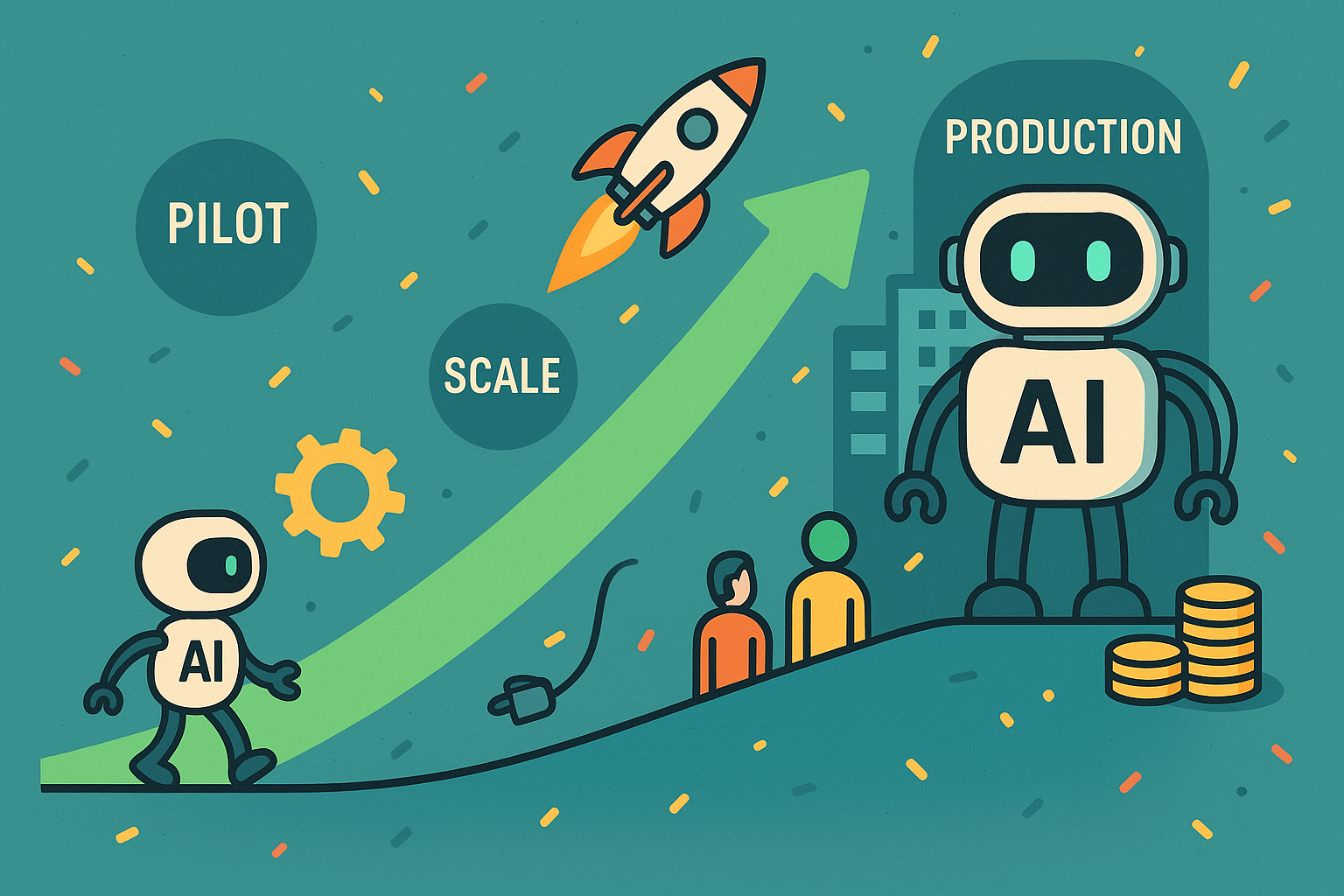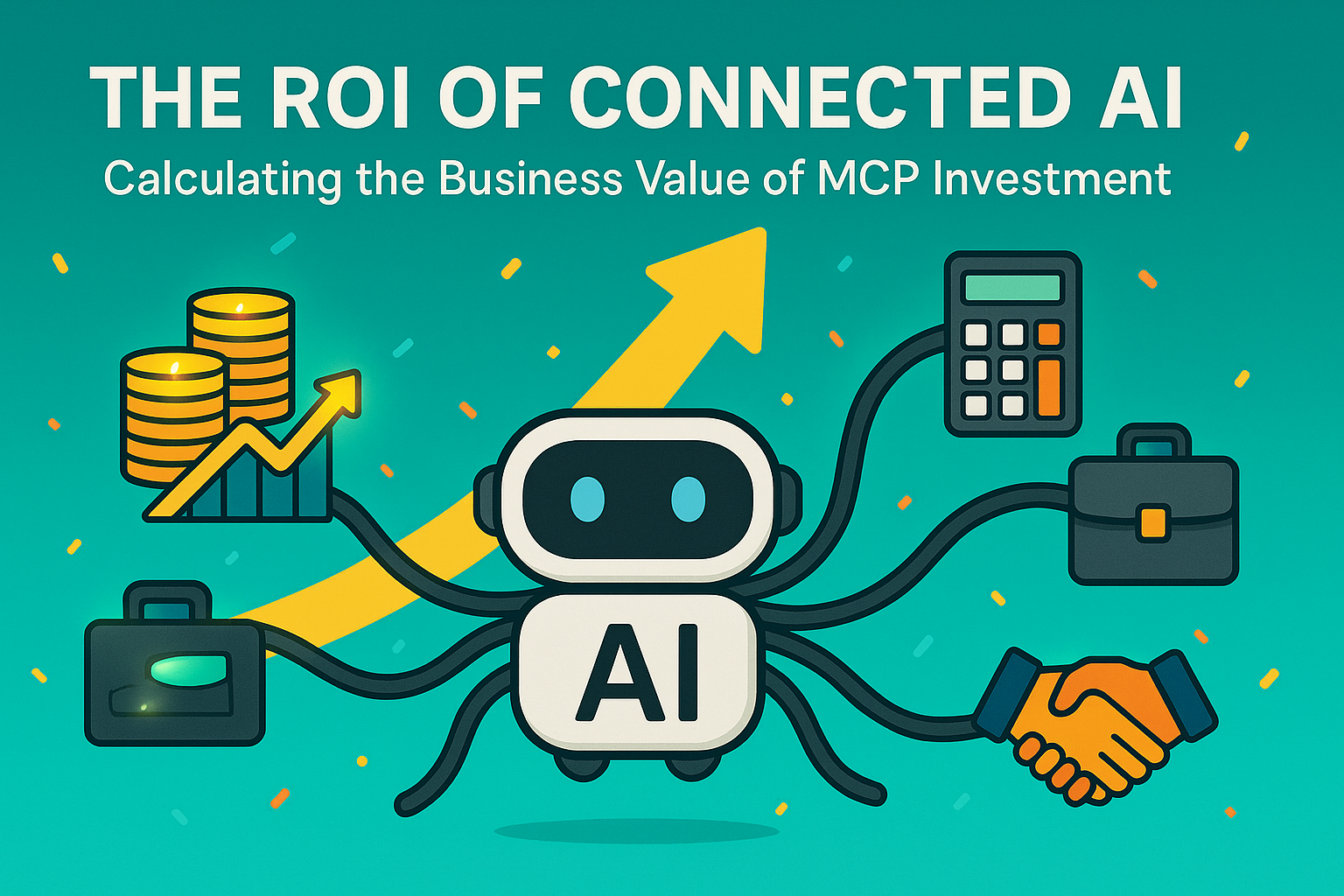From Pilot to Production: A Strategic Roadmap for MCP Deployment
A proven framework for taking MCP from initial pilot to production-scale deployment, based on lessons learned from early enterprise adopters.

Most organizations approach MCP deployment with either excessive caution (limiting scope so much that benefits never materialize) or insufficient planning (creating technical debt and user frustration that undermines long-term success). The organizations that succeed with MCP follow a strategic roadmap that balances innovation with operational discipline.
This guide provides a proven framework for taking MCP from initial pilot to production-scale deployment, based on lessons learned from early enterprise adopters.
Phase 1: Foundation and Pilot (Months 1-3)
Strategic Objectives
- Validate MCP value proposition with concrete business outcomes
- Establish technical foundation for scalable deployment
- Build internal expertise and champion network
- Identify implementation patterns for broader rollout
Pilot Selection Criteria
High-Impact, Low-Complexity Use Cases: Choose scenarios where MCP provides clear advantages over existing solutions while minimizing technical complexity. Customer service enhancement and sales proposal automation typically offer ideal starting points.
Measurable Business Outcomes: Select pilots with quantifiable success metrics. Examples include:
- Reduction in average customer service resolution time
- Increase in sales proposal win rates
- Decrease in manual data gathering activities
- Improvement in user satisfaction scores
Contained Scope: Limit pilot to 50-100 users across 2-3 business systems to maintain focus and manageability while providing meaningful validation.
Executive Sponsorship: Ensure pilot use cases align with strategic business priorities and have visible leadership support.
Technical Foundation Setup
Core Infrastructure Deployment:
- MCP proxy gateway with basic authentication and audit logging
- Initial MCP servers for 2-3 critical business systems
- Development and testing environments
- Basic monitoring and alerting capabilities
Security Baseline:
- Integration with existing identity providers
- Role-based access control for pilot users
- Audit log integration with SIEM systems
- Security assessment and penetration testing
Governance Framework:
- Data access policies and procedures
- Change management processes
- Incident response procedures
- Performance monitoring and SLA definitions
Success Metrics and Validation
Technical Metrics:
- System availability and response times
- Integration reliability and error rates
- Security incident frequency
- User adoption and engagement rates
Business Metrics:
- Process efficiency improvements
- Quality enhancements in outputs
- User satisfaction and feedback
- ROI calculation based on time savings
Key Deliverables
- Functional MCP deployment serving pilot users
- Documented integration patterns and best practices
- Business case validation with quantified benefits
- Roadmap for Phase 2 expansion
Phase 2: Selective Expansion (Months 4-8)
Strategic Objectives
- Scale successful pilot patterns to additional use cases
- Develop organizational capabilities for MCP management
- Establish center of excellence for enterprise AI
- Build momentum for organization-wide adoption
Expansion Strategy
Horizontal Scaling: Apply successful pilot patterns to similar use cases across different departments. If customer service succeeds, expand to technical support, field service, and sales support.
Vertical Integration: Deepen integration within existing use cases by connecting additional systems and enabling more sophisticated workflows.
Use Case Diversification: Add 2-3 new use case categories based on pilot learnings and business priorities. Common expansion areas include:
- Financial analysis and reporting
- IT operations and monitoring
- Project management and resource planning
- Compliance and risk management
Technical Scaling
Infrastructure Enhancement:
- High availability and disaster recovery capabilities
- Advanced monitoring and performance optimization
- Automated deployment and configuration management
- Capacity planning and resource scaling
Security Maturation:
- Advanced threat detection and behavioral analytics
- Comprehensive compliance monitoring and reporting
- Enhanced data governance and privacy controls
- Regular security assessments and updates
Integration Expansion:
- MCP servers for 5-10 additional business systems
- API gateway integration for legacy system connectivity
- Data warehouse and analytics platform connections
- Third-party service integrations
Organizational Development
Center of Excellence Establishment:
- Dedicated team for MCP strategy and governance
- Training programs for developers and business users
- Best practice documentation and knowledge sharing
- Vendor relationship management and procurement
Change Management Program:
- Executive communication and progress reporting
- Department-specific training and adoption support
- User feedback collection and feature prioritization
- Success story documentation and internal marketing
Governance Maturation
Policy Development:
- Comprehensive data access and usage policies
- AI ethics and responsible use guidelines
- Integration standards and architectural principles
- Performance and quality standards
Process Optimization:
- Streamlined onboarding for new use cases
- Automated provisioning and deprovisioning
- Change approval and deployment procedures
- Incident management and escalation processes
Key Deliverables
- MCP deployment serving 200-500 users across multiple departments
- Established center of excellence with documented processes
- Proven scalability and performance at moderate scale
- Executive dashboard showing business impact metrics
Phase 3: Enterprise Scale (Months 9-18)
Strategic Objectives
- Deploy MCP across entire organization
- Achieve full integration with enterprise architecture
- Establish MCP as core digital infrastructure
- Realize transformative business value at scale
Scaling Strategy
Organization-Wide Rollout: Systematic deployment across all business units with customized approaches for different organizational needs and maturity levels.
Complete System Integration: Connection of all relevant business systems to MCP infrastructure, creating comprehensive AI-accessible data and capability ecosystem.
Advanced Use Case Enablement: Implementation of sophisticated workflows that leverage multiple systems and data sources for complex business processes.
Technical Excellence
Enterprise Architecture Integration:
- Full integration with existing enterprise architecture patterns
- Standardized deployment across multiple data centers or cloud regions
- Integration with enterprise monitoring and management platforms
- Compliance with all relevant security and regulatory requirements
Performance Optimization:
- Load balancing and auto-scaling capabilities
- Caching and performance optimization
- Network optimization and edge deployment
- Predictive capacity planning and resource management
Advanced Capabilities:
- Machine learning integration for usage optimization
- Advanced analytics and business intelligence
- Real-time monitoring and alerting
- Automated recovery and self-healing capabilities
Business Transformation
Process Reengineering: Fundamental redesign of business processes to leverage AI capabilities, moving beyond automation to transformation.
Cultural Adoption: MCP-enabled AI becomes integral to how employees work, with high adoption rates and user satisfaction.
Competitive Advantage: Measurable business outcomes that provide clear competitive differentiation in the marketplace.
Governance at Scale
Enterprise Governance:
- Board-level reporting and oversight
- Comprehensive risk management framework
- Vendor management and contract optimization
- Budget planning and ROI tracking
Operational Excellence:
- 24/7 operations and support capabilities
- Continuous improvement processes
- Disaster recovery and business continuity
- Compliance audit and certification maintenance
Key Deliverables
- Enterprise-scale MCP deployment serving entire organization
- Measurable business transformation outcomes
- Established operational excellence and governance
- Strategic roadmap for continued innovation
Phase 4: Innovation and Optimization (Months 18+)
Strategic Objectives
- Leverage MCP foundation for advanced AI capabilities
- Drive continuous innovation and improvement
- Establish organization as AI leader in industry
- Maximize return on MCP investment
Advanced Capabilities
Next-Generation AI Integration:
- Integration with emerging AI technologies and models
- Advanced automation and intelligent workflows
- Predictive analytics and decision support
- Personalized user experiences and recommendations
Ecosystem Expansion:
- Partner and vendor integration through MCP
- Customer-facing AI capabilities
- Supply chain and ecosystem optimization
- Industry-specific innovations and applications
Continuous Improvement
Performance Optimization:
- Ongoing performance monitoring and optimization
- User experience enhancement based on feedback
- Cost optimization and efficiency improvements
- Technology refresh and upgrade planning
Innovation Pipeline:
- Experimental use case development
- Emerging technology evaluation and integration
- Academic and industry partnership development
- Internal innovation programs and hackathons
Critical Success Factors
Leadership and Sponsorship
Strong executive sponsorship throughout all phases is essential. MCP deployment requires sustained commitment and investment over 12-18 months to reach full value realization.
Technical Expertise
Building internal MCP expertise is crucial for long-term success. Organizations should invest in training existing staff rather than relying solely on external consultants.
Change Management
User adoption is often the limiting factor in MCP success. Comprehensive change management programs ensure that technology capabilities translate into business value.
Incremental Value Delivery
Each phase should deliver measurable business value that justifies continued investment and builds momentum for subsequent phases.
Realistic Timeline Expectations
Rushing deployment phases often creates technical debt and user frustration that undermines long-term success. Allow adequate time for each phase while maintaining momentum.
Risk Mitigation Strategies
Technical Risks
- Comprehensive testing and validation at each phase
- Gradual rollout with rollback capabilities
- Performance monitoring and capacity planning
- Regular security assessments and updates
Business Risks
- Clear success metrics and regular measurement
- Stakeholder communication and expectation management
- Alternative use case identification and planning
- Vendor relationship management and contingency planning
Organizational Risks
- Change management and user adoption programs
- Training and skill development initiatives
- Cultural alignment and leadership modeling
- Communication and feedback mechanisms
Measuring Success
Phase-Specific Metrics
Phase 1 (Pilot):
- Technical functionality and reliability
- User satisfaction and adoption rates
- Initial business outcome improvements
- Learning and capability development
Phase 2 (Expansion):
- Scalability and performance validation
- Broader business impact measurement
- Organizational capability maturation
- Process efficiency improvements
Phase 3 (Enterprise Scale):
- Organization-wide adoption and usage
- Comprehensive business transformation outcomes
- Operational excellence and governance maturity
- Competitive advantage realization
Phase 4 (Innovation):
- Advanced capability deployment
- Continuous improvement and optimization
- Industry leadership and recognition
- Long-term ROI and value creation
The Path Forward
MCP deployment success requires balancing ambition with pragmatism. Organizations that follow this strategic roadmap, adapt it to their specific context, and maintain discipline throughout execution consistently achieve transformative business outcomes.
The key is viewing MCP not as a technology deployment but as a business transformation initiative that happens to leverage technology. With proper planning, execution, and commitment, MCP becomes the foundation for sustained competitive advantage in an AI-driven business landscape.
Get Access to Premium Content
Fill out the form below to get instant access to this exclusive content.
Read More

The 6 MCPs Every Developer Should Have (And How to Govern Them)
Git repos, email, Slack, meeting transcripts, calendar, docs — these six MCP connections transform developer productivity. Here's what each one unlocks, what risks they carry, and how to govern them properly.

The ROI of Connected AI: Calculating the Business Value of MCP Investment
A comprehensive analysis of the tangible and intangible returns organizations can expect from implementing MCP infrastructure, including frameworks for calculating ROI and real-world scenarios that demonstrate the protocol's business impact.
Ready to Future-proof your AI Strategy?
Transform your business with secure, controlled AI integration
Connect your enterprise systems to AI assistants while maintaining complete control over data access and user permissions.